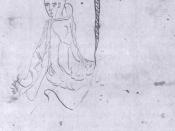Why was William of Ockham considered to be the initiator of the "modern way" of doing philosophy?
William if Ockham was a philosopher and theologian born is southern England (1285). He joined the Franciscans and eventually became prominent in that religious order. Ockham studied at Oxford University and went on to teach theology there. The tradition that he was Duns Scotus' pupil was probably correct, as his influence can be seen in Ockham's writings. In 1324, Pope John XXII summoned him to Avignon, France, to answer charges of heresy. Ockham remained in Avignon for four years. In 1328, he fled to the protection of Louis of Bavaria, who was the Holy Roman Emperor and an enemy of the pope. Ockham remained in Munich until his death (1347).
It was in the 14th century that philosophy began to disintegrate, this was due to many factors, such as the public scandals of the Church, the 100 years war, and the Black Death.
One mark of the destructive forces of the Church was the revival of nominalism, for which William of Ockham is mainly responsible.
Nominalism
The great revival of philosophical and theological study, which the thirteenth century witnessed, was conditioned by the influence of both Aristotle and Plato. St Augustine agrees with Plato's account of the universals: that they are forms and exist in their own spiritual realm, only known to the intellect and not the senses. Thomas Aquinas, on the other hand, disagreed with Augustine and Plato, developing the "shared attribution" realism of Aristotle. Universals, for Augustine, are essences which do not exist without being in the world, but which may be arrived at without a supposed existence.
William of Ockham takes an alternative approach called nominalism. He asserts that "no universal is a subject existing outside of the mind", maintaining...


